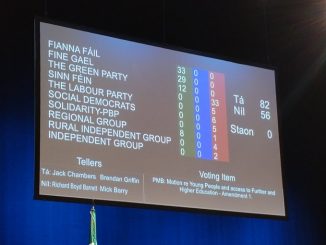
Fianna Fáil Spokesperson for Education, TD Charlie McConalogue said opposing the student registration fee will not make the problem of third level funding go away.
In an interview with The College View last week, he said “I don’t want to say that opposing the student registration fee makes the problem of third level funding go away, absolutely not. That’s something that has to be addressed. We can’t have a situation where by we continue to have underfunding and we continue to have our standards slipping.”
McConalogue thinks radical reform is needed in the third level sector to improve the quality of courses. “There’s undoubtedly duplication in the third level sector. Many colleges around the country run the same courses, run the same departments and try to have the same level of expertise without necessarily getting to the level of excellence that’s required and that’s costly.
“We need radical reform to ensure there’s value for money there and that there’s productivity in terms of the money that’s currently being put into it. We can remove the duplication that’s there and get colleges to work closely together and I think the idea of colleges working more closely together is very important. At the moment we have in the region of forty engineering courses in the country. There is no need for that. You can’t have forty centres of excellence in a country the size of Ireland.”
McConalogue said he has met with the USI but hasn’t attended any of the USI regional protests. “I have been in close contact with the USI and other student representatives as well on the issue.”
The TD hasn’t met with anyone from the DCU Students’ Union, but said he’d be more than happy to meet with them.
He also commented on the recent funding referendum in DCU, before the results were declared. “The approach that’s been taken by the Students’ Union in DCU with having a referendum on the future of funding the third level sector, I think it shows a student body which is very mature in recognising the challenge that is there and also engaging the student body in terms of how they’ll go about that. It also means the issues are explored in a substantive way with the students and I welcome it.”
When asked about the impact of the Croke Park Agreement on third level education and lecturers’ salaries being protected while students face fee increases, McConalogue paused to think before answering: “We do need to ensure there is wage constraint and wage control at third level and there’s bound to be waste there and excessive salaries and we need to look at that.
“At the same time, the staff numbers have reduced and there have been cuts to staff levels. Undoubtedly the fact that, because of Croke Park [agreement], there isn’t the potential there to actually address other areas where maybe there could be movement to find more savings at the higher wage levels.”
Commenting on the scrapping of the postgrad maintenance grant in last year’s budget, McConalogue said it has ruled people out of continuing their education and “it’s also reducing the overall qualifications of our workforce”.
“It’s a much more intense reflection of what could be facing undergrad level unless we come up with a model that’s more sustainable.”
In relation to the delays in the SUSI processing grant applications and payments, McConalogue said he’s had a very substantial number of students contacting him and it’s unacceptable what has happened.
He said there’s always been problems with individual local authorities processing grants and the idea behind centralising the system was to prevent these problems.
McConalogue doesn’t think the Minister has done enough to pursue the issue and Fianna Fáil recently tabled a motion in the Dail to highlight this. “As a result of the motion he apologised to students and took responsibility for the situation. I still don’t think he’s taken enough responsibility to sort it out because the new targets still aren’t being met. He needs to get involved and get his hands dirty.”
McConalogue said that Fianna Fáil currently don’t have an official stance on funding third level education but are in the process of exploring their options. “Where we’re at at the moment is we’re assessing the different options that are there.
“We also understand that the continuation of the system as it is is not sustainable because it’s leading to an under funding of the third level system, which is affecting quality”.
He said the current system is affecting middle class families that are not eligible for grants as well as students who receive grants but still struggle to cover the cost of going to college.
“We do want to ensure that third level education is available to everyone. A key principle for us is equality of access regardless of somebody’s financial background. That’s a core principle for us but what structure we build around that, we’ll have to explore further.”
McConalogue doesn’t believe the minister’s plan to increase the registration fee by €250 a year every year until 2015 will meet the funding needs of third level institutions.
Commenting on Ruairi Quinn as Minister for Education, McConalogue said: “He’s a very experienced politician; he’s a former Minister for Finance and was well aware of the financial constraints the country was under at the time [Quinn signed the USI pledge to not increase fees]. He has turned around and done the exact opposite of what he promised to do. I’ve been very strong on opposing him on that basis. They very much used students to gain power.”
Aoife Mullen




Leave a Reply